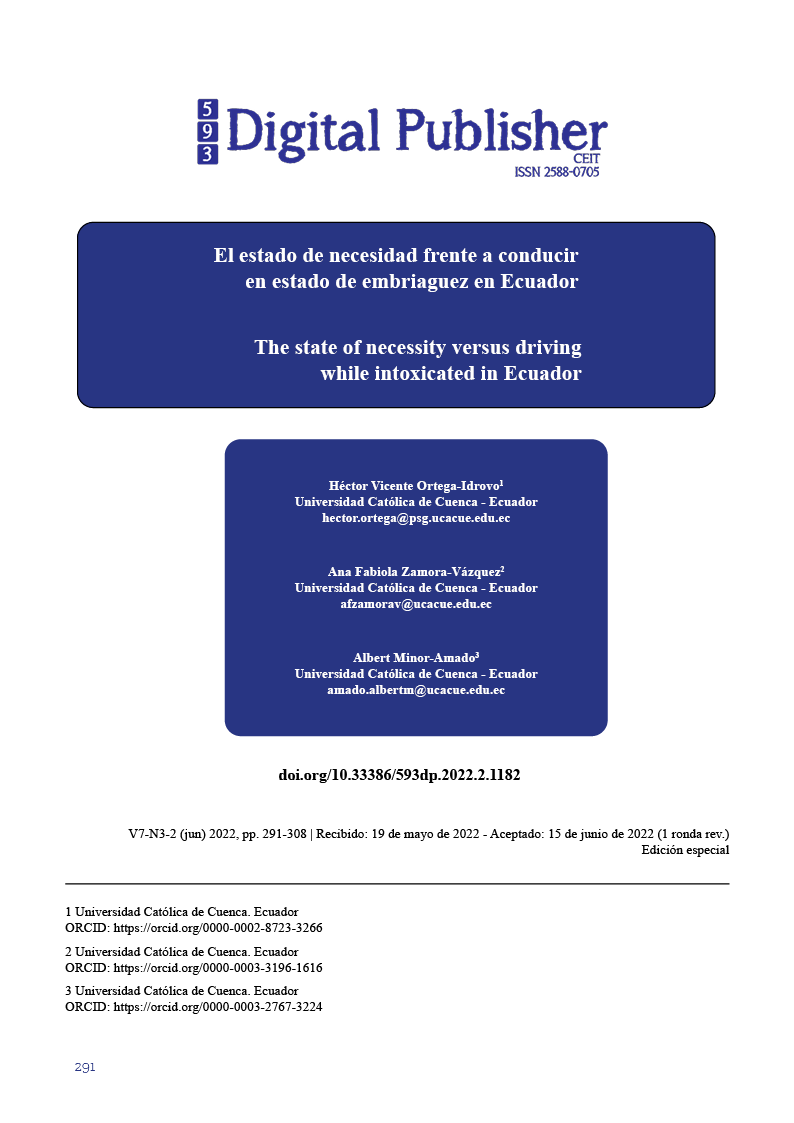The state of necessity versus driving while intoxicated in Ecuador
Main Article Content
Abstract
In Ecuadorian legislation, at the time that a person is arrested for allegedly driving a vehicle while intoxicated, the judge does not consider that this fact can be framed within the causes of exclusion of illegality, specifically of the state of necessity and, before the non-observance or lack of justification, they grant penalties. Under this premise, the objective of this scientific research was to analyze the state of necessity, in traffic offenses for driving while intoxicated. The methodology that was proposed was descriptive with a qualitative approach, which was carried out through a bibliographic review. To collect the information, the different databases were used, such as: Scielo, Scopus, Google Scholar, Dialnet and Redalyc; With the extracted information, an analysis of a socio-legal nature was carried out within criminal law. In short. The state of drunkenness constitutes an aggravating factor at the time of establishing a sentence, despite the fact that a subject, by protecting a legal asset of greater value, injures another asset of lesser value; that is, it justifies the existence of the state of necessity and therefore, its conduct falls within the grounds for exclusion of illegality
Downloads
Article Details

This work is licensed under a Creative Commons Attribution-NonCommercial-ShareAlike 4.0 International License.
1. Derechos de autor
Las obras que se publican en 593 Digital Publisher CEIT están sujetas a los siguientes términos:
1.1. 593 Digital Publisher CEIT, conserva los derechos patrimoniales (copyright) de las obras publicadas, favorece y permite la reutilización de las mismas bajo la licencia Licencia Creative Commons 4.0 de Reconocimiento-NoComercial-CompartirIgual 4.0, por lo cual se pueden copiar, usar, difundir, transmitir y exponer públicamente, siempre que:
1.1.a. Se cite la autoría y fuente original de su publicación (revista, editorial, URL).
1.1.b. No se usen para fines comerciales u onerosos.
1.1.c. Se mencione la existencia y especificaciones de esta licencia de uso.
References
Agudelo Betancurt, J. (18 de octubre de 1998). Esquema del delito. Obtenido de https://www.academia.edu/24931802/Esquemas_del_Delito_Nodier_Agudelo
Asamblea Nacional. (2012). Reglamento para la Aplicación de la Ley de Transporte Terrestre Tránsito y Seguridad Vial. Registro Oficial Suplemento 731.
Asamblea Nacional. (10 de febrero de 2014). Código Orgánico Integral Penal. Obtenido de https://tbinternet.ohchr.org/Treaties/CEDAW/Shared%20Documents/ECU/INT_CEDAW_ARL_ECU_18950_S.pdf
Asamblea Nacional. (10 de 02 de 2014). Código Orgánico Integral Penal. Obtenido de https://tbinternet.ohchr.org/Treaties/cedaw/shared%20documents/ecu/int_cedaw_arl_ecu_18950_s.pdf
Atehortua, F. H., & Zwerg Villegas, A. M. (2012). Metodología de la investigación, más que una receta.
Bustos Ramírez, J. J. (2008). Derecho Penal. Parte General. Volumen III. Quito.: Ediciones Jurídicas.
Cerezo MIr, J. (2005). Derecho Penal, Parte General. Sevilla.: Pearson.
Cobo del Rosal, M. (1999). Derecho Penal. Parte General. Valencia: Tirant Lo Banch Ediciones.
Donna, A. (2007). Derecho Penal II. Buenos Aires: Rubinzal- Culzoni.
Espinosa, G. (1987). La más práctica. Enciclopedia Jurídica. Quito-Ecuador: Instituto de Informática Básica.
Ferrajoli, L. (1987). Derecho y razón; teoría del garantismo penal. Florencia: trotta.
Gómez López, J. O. (2006). Teoría del Delito. Madrid: Trillas.
Jiménez de Asúa, J. (2003). Los elementos del delito, antijuridicidad y justificación. Sevilla: Trillas.
Lopera, J. D., Ramírez, C. A., Zuluaga, M., & Ortíz, J. (2010). El método analítico como método natural. Critical Journal of Social ans Juridicial Sciences.
López Gómez, M. (2003). Teoría del Delito. Bogotá: Doctrinaria.
Luzón Peña, D. M. (2012). Lecciones de Derecho Penal. Parte General. Valencia: Tirant Blanch.
Medina, S. (2005). Teoría del Delito, Causalismo, Finalismo, Funcionalismo e Imputación Objetiva. Madrid: Causar Ediciones.
Mir Puig, S. (2008). Derecho penal. Parte General. 1ª edición. Buenos Aires.: Euros Editores SRL.
Muñoz Conde, F. (1999). Teoría General del Delito. Bogotá: Temis.
Náquira, J. (1998). Derecho Penal, Teoría del Delito. Santiago.: McGrawHill.
Quinteros Olivares, G. (2010). Parte General del Derecho Penal. 4ta edición. Pamplona.: Trillas,.
Reyes, A. (1999). Antijuridicidad. 1ª edición. Bogotá: Temis.
Righi, E. (2008). Derecho penal. Parte General. 1ª edición. Buenos Aires: Lexis Nexis.
Roxin, C. (1997). Derecho Penal Parte General. Alemania: Civitas.
Roxin, C. (2008). Derecho Penal Parte General. Buenos Aires: Rubinzal- Culzoni.
Triffterer, O. (2000). Derecho Penal, Parte General. Cali: Paidos.
Villasol, A. (1999). Prueba Penal y Culpa en accidentes de tránsito. La Plata- Argentina.: Librería Editorial Platense.
Vives Antón, T. S. (1999). Derecho Penal, Parte General. Valencia: Tirant Lo Banch Ediciones.
Von Liszt, F. (2010). Tratado de Derecho Penal. México: Ángel.
Welzel, H. (1956). Derecho Penal, Parte General. Buenos Aires.: Trillas.
Zaffaroni, E. R. (2000). Tratado de Derecho Penal. Parte general. tomo 1ª. Buenos Aires: EDIAR.




